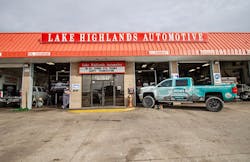SHOP STATS: Lake Highlands Automotive Location: Dallas, Texas Operator: Jordon and Reg Baker Average Monthly Car Count: 720 Staff Size: 13 Shop Size: 5,000 sq. ft. Annual Revenue: $3 million
June 9, 2019, seemed to be a typical Sunday morning in the city of Dallas. Jordon Baker, owner of Lake Highlands Automotive, was getting ready to take his son to church camp and to attend his daughter’s dance recital later that day. All of a sudden, clouds started to form, the daylight suddenly turned into night, and wind power picked up to high speeds.
What was supposed to be a relaxing Sunday turned into a nightmare for most.
The Washington Post described the storm as a “massive rain bomb” over Dallas, and the pictures don’t lie. The storm only lasted an hour and a half, but did more damage than the city expected—Baker says “thousands and thousands and thousands” of trees were down throughout the city.
“It looked like a war zone,” Baker says. “One hundred–year-old trees were down and a lot of people couldn’t get out of their house.”
According to The Dallas Morning News, close to 220,000 homes were without power in Dallas County alone. And by noon the next day, 205,000 were still without power, along with 13,000 more in surrounding counties.
Baker’s shop was one of the places affected by the power outage; no power meant no work for the shop for two whole days. But, by thinking of the bigger picture, Baker was able to use those two days to his advantage and grow his customer base.
Baker details how his shop decided to turn a terrible event into a positive impact for the community and his shop.
The Backstory
Lake Highlands Automotive has been in operation since Reg Baker, Jordon’s father, purchased the shop’s former facility in 1989, moving to its current location in 2003.
Baker has always been very active in the community. He puts on multiple events throughout the year that directly benefit the shop. For instance, Baker donates $7,000 to $10,000 each year to the local YMCA, including the local organization’s golf tournament, benefiting underprivileged kids. To bring the community together, he hosts and sponsors events, such as the shop’s first cornhole tournament this year, and he recently helped out a high school student ask someone to homecoming—changing the shop’s sign to say, “Jenna, it would be so clutch if you would go to HoCo with me. —Garrett” (spoiler alert: She said yes).
Baker says nothing he puts on for the community costs money, just time. People in the community willingly help out with the events and donate their goods when needed; all he has to do is make a couple calls.
“When I get my community involved in something, I can gain people’s trust,” Baker says. “I’m not just a mechanic, but a neighbor and a friend.”
The Problem
The June storm had a major impact on the community. Thankfully, the storm didn’t directly hit the shop, but it did affect the shop’s ability to work. For two days, the shop was without power, which meant Baker’s crew couldn’t get anything done, or earn any money. And, the shop didn’t have a plan in place simply because something like this never happens in the area.
Baker had one of two choices: He could either shut down his shop until the power came back on, cutting payroll to try and save money, or he could keep staff on payroll and rally up his crew to create a positive impact, which could lead to business growth down the line.
The Solution
Instead of him and his crew sitting around waiting for the power to come back on, he decided to be proactive and make the most out of the shop’s current situation.
Baker sent out a Facebook post on the shop’s business page saying the shop would be on duty with trucks and chainsaws as a “goodwill service to the neighborhood.”
All of a sudden, comments and messages started pouring in left and right. Baker says, overall, the post was shared 92 times, reached a total of about 14,000 people, and engaged 1,700 people.
A quick look at the comments from those shares reveals a slew of positive sentiments about the shop:
“I’ve always loved that place; they are the best.”
“They are amazing with car service.”
“Gotta love these guys!”
“This is the car business I was telling you about.”
Even the District 10 City Council Representative, Adam McGough, reached out to the shop to help out in other surrounding neighborhoods.
For some extra hands on deck, Baker reached out to one of his high school friends who owns a local roofing company, Brown Roofing Solutions Inc., to see if his crew would help out with their initiative. With three trucks and an extensive amount of chainsaws, both staff (totaling more than a dozen) headed out in uniform to lend a helping hand.
The entire crew worked long, 12-hour days, helping cut down and move trees for people who were trapped or couldn’t access their home. And, with so many people needing help, Baker worked two extra days on top of that to help out those he couldn’t get to while the power was out. One household, for example, was quoted $4,500 just to move a tree out of the way. Instead, Baker and Brown took care of the job for free—it took six hours with the help of another crew member.
The effort from the entire crew helped roughly 40 to 50 people with Baker and Brown helping an additional 10 residents.
The Aftermath
After two workdays with no power, the lights finally switched back on around 3 p.m. that Tuesday with the shop back in business the next day. To this day, Baker estimates he acquired 30 to 40 new customers just from the shop’s efforts the day of the storm.
So far, the shop’s revenue has increased by $350,000 since 2018, largely thanks to that bump in June.
“It’s not always all for profit. Sometimes there are bigger things that you could be doing,” Baker says.
The community heard what Baker did and, because of it, when the time came to get their cars repaired, his shop was at the top of mind.
The Takeaway
The most important takeaway Baker wants shops to know is that it’s all about your mindset. Many may feel like they don’t have time to give back, but if they look down the road at the impact it will have on their business, it’s well worth it.
“I could have cut my payroll that day, but instead, I gave all of my guys an opportunity to earn and do something good for this community, knowing that it was going to have a positive impact on my shop,” Baker says.
Most shops, Baker says, are profit-driven; they’re more willing to spend money on marketing and mailers than spend time giving back. He says if shops take the focus off of money and put it on their communities, it’ll work in their favor. He lost sales for those two days, but it paid off in the long run.
Preparing for the Worst
Even if you think a storm or disaster is unlikely to affect your shop as Baker did, you may want to adjust your mindset and plan ahead for the possibility. Cate Steane, founder of Make It Happen Preparedness Services, shares her tips on preparing for this situation ahead of time.
—
Tip No. 1: Take advantage of insurance.
Make sure your policy is up to date and the coverage is there. Utilizing insurance to the best of its ability will help you recover faster. Steane says most insurance companies will come out for free to make sure things are safe at your shop, and you won’t be penalized for it.
Tip No. 2: Protect your investment.
Steps to protect your investment should be included in your plan when it comes to insurance, cash reserves, line of credit and pre-documenting claims.
Steane says to have cash reserves or a line of credit to keep employees on the payroll.
Tip No. 3: Make a plan.
Putting the perfect plan in place will ensure your business will be able to stand up on its own two feet following a disaster.
Your plan should include evacuation procedures, how to operate during a utility interruption, and a plan for how to reopen within five days.
Documents to Keep Safe
- Revenue records
- Expense records
- Invoicing
- Payroll
- Inventory of tools, equipment, and supplies
- Inventory of all vehicles on the premises (and yes, update this daily)
- Title to any owned vehicles
- Lease agreements for leased vehicles
- Documents relating to licensing, training, and HR
- Frequently-used manuals
- Lease
- Insurance policies
- Title to property

